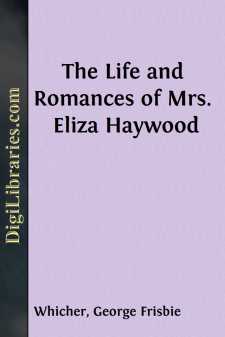Categories
- Antiques & Collectibles 13
- Architecture 36
- Art 48
- Bibles 22
- Biography & Autobiography 813
- Body, Mind & Spirit 142
- Business & Economics 28
- Children's Books 14
- Children's Fiction 11
- Computers 4
- Cooking 94
- Crafts & Hobbies 4
- Drama 346
- Education 46
- Family & Relationships 57
- Fiction 11828
- Games 19
- Gardening 17
- Health & Fitness 34
- History 1377
- House & Home 1
- Humor 147
- Juvenile Fiction 1873
- Juvenile Nonfiction 202
- Language Arts & Disciplines 88
- Law 16
- Literary Collections 686
- Literary Criticism 179
- Mathematics 13
- Medical 41
- Music 40
- Nature 179
- Non-Classifiable 1768
- Performing Arts 7
- Periodicals 1453
- Philosophy 64
- Photography 2
- Poetry 896
- Political Science 203
- Psychology 42
- Reference 154
- Religion 513
- Science 126
- Self-Help 84
- Social Science 81
- Sports & Recreation 34
- Study Aids 3
- Technology & Engineering 59
- Transportation 23
- Travel 463
- True Crime 29
The Life and Romances of Mrs. Eliza Haywood
Description:
Excerpt
CHAPTER I
ELIZA HAYWOOD'S LIFE
Autobiography was almost the only form of writing not attempted by Eliza Haywood in the course of her long career as an adventuress in letters. Unlike Mme de Villedieu or Mrs. Manley she did not publish the story of her life romantically disguised as the Secret History of Eliza, nor was there One of the Fair Sex (real or pretended) to chronicle her "strange and surprising adventures" or to print her passion-stirring epistles, as had happened with Mrs. Aphra Behn's fictitious exploits and amorous correspondence[1]. Indeed the first biographer of Mrs. Haywood[2] hints that "from a supposition of some improper liberties being taken with her character after death by the intermixture of truth and falsehood with her history," the apprehensive dame had herself suppressed the facts of her life by laying a "solemn injunction on a person who was well acquainted with all the particulars of it, not to communicate to any one the least circumstance relating to her." The success of her precaution is evident in the scantiness of our information about her. The few details recorded in the "Biographia Dramatica" can be amplified only by a tissue of probabilities. Consequently Mrs. Haywood's one resemblance to Shakespeare is the obscurity that covers the events of her life.
She was born in London, probably in 1693, and her father, a man by the name of Fowler, was a small shop-keeper.[3] She speaks vaguely of having received an education beyond that afforded to the generality of her sex. Her marriage to Valentine Haywood,[4] a clergyman at least fifteen years older than his spouse, took place before she was twenty, for the Register of St. Mary Aldermary records on 3 December, 1711, the christening of Charles, son of Valentine Haywood, clerk, and Elizabeth his wife. Her husband held at this time a small living in Norfolk, and had recently been appointed lecturer of St. Mathews, Friday Street. Whether the worthy cleric resided altogether in London and discharged his duties in the country by proxy, or whether Mrs. Haywood, like Tristram Shandy's mother, enjoyed the privilege of coming to town only on certain interesting occasions, are questions which curious research fails to satisfy. At any rate, one of the two children assigned to her by tradition was born, as we have seen, in London.
No other manifestation of their nuptial happiness appeared until 7 January, 1721, on which date the "Post Boy" contained an Advertisement of the elopement of Mrs. Eliz. Haywood, wife of Rev. Valentine Haywood.[5] The causes of Eliza's flight are unknown. Our only knowledge of her temperament in her early life comes from a remark by Nichols that the character of Sappho in the "Tatler"[6] may be "assigned with …probability and confidence, to Mrs. Elizabeth Heywood, who …was in all respects just such a character as is exhibited here." Sappho is described by Steele as "a fine lady, who writes verses, sings, dances, and can say and do whatever she pleases, without the imputation of any thing that can injure her character; for she is so well known to have no passion but self-love, or folly but affectation, that now, upon any occasion, they only cry, 'It is her way!' and 'That is so like her!' without farther reflection." She quotes a "wonderfully just" passage from Milton, calls a licentious speech from Dryden's "State of Innocence" an "odious thing," and says "a thousand good things at random, but so strangely mixed, that you would be apt to say, all her wit is mere good luck, and not the effect of reason and judgment." In the second paper Sappho quotes examples of generous love from Suckling and Milton, but takes offence at a letter containing some sarcastic remarks on married women....


